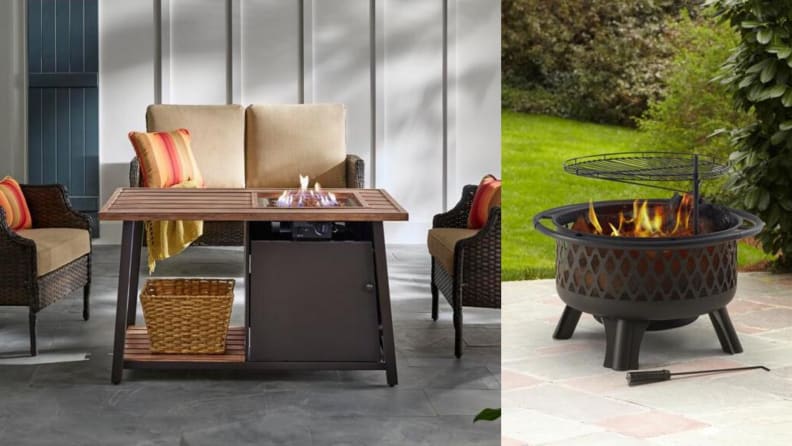5 questions to ask before buying that pergola for your patio
You’ll be sittin’ pretty this summer
Products are chosen independently by our editors. Purchases made through our links may earn us a commission.
Creating an outdoor seating, entertaining, or relaxation space is a common goal for many homeowners. One of the best ways to create a dedicated space is with a pergola. These attractive shelters allow you to enjoy the outdoors while giving you some protection from the sun or weather.
This said, pergolas are not a small investment. There are also many different styles and options to choose from. So, before you make a purchase, we’ve got five questions you should ask.
1. Do you want a pergola or a pavilion?

The difference in a perola and a pavilion is the roof style.
Pergola and pavilion are often used interchangeably, but the two are different. A pergola is a freestanding structure with a lattice or slatted top. This allows the sunshine to come through while still providing shade. Some pergolas come with an optional canopy that can be hung or removed depending on the weather.
A pavilion, on the other hand, is a freestanding structure with a solid roof. That roof can be traditional shingles, metal, vinyl, glass, or fiberglass, but it is not removable. Some roofs may even be translucent or transparent to let light through.
2. What material matches your budget, aesthetic, and maintenance comfort?
Pergolas can be made from all kinds of materials, which have different benefits and drawbacks. It’s important to understand them all before making your final decision.
Wood
Wood—usually either pressure treated or cedar—is a common material used to build pergolas or any outdoor structure. Pressure-treated wood tends to be the most affordable option, while cedar can add significant cost. Both are moisture and insect resistant and can be stained or painted to match your personal style.
However, wood is one of the most maintenance-heavy materials for a pergola. It needs to be stained, sealed, and/or resanded every few years to maximize its lifespan. Wood color also fades over time, especially if maintenance is overlooked. Finally, wood comes with the risk of splinters, so if you have small children who can’t help but climb things they’re not supposed to, wood may not be a safe option.
Vinyl
Many pergolas are made from vinyl. This is an easy-to-maintain option that should keep its look for years and years. The only maintenance required is to clean the pergola every few years with a vinyl siding cleaner. Vinyl will also trend on the more affordable end of the spectrum, so it can be a solid budget-conscious choice.
However, vinyl does have some drawbacks. The first is that there aren’t going to be many color choices. Most of the vinyl pergolas you find will be some variation of white. Second, vinyl can crack and break more easily than some of the other materials, so it may not stand up to rugged use. Finally, vinyl is going to be more susceptible to wind, so needs to be securely anchored.
Metal
Pergolas can also be made from metal. While these tend to be more expensive, they are durable, highly weather-resistant, and don’t require much maintenance at all. They can be easily painted and re-painted, and are simple to clean.
The drawbacks of metal pergolas are their cost and weight. These are usually among the more expensive pergolas that you will find. An aluminum pergola is relatively light, and so needs to be securely anchored or it could blow away. On the flip side, a steel pergola will likely be quite heavy, and so it can be difficult to move and position. Steel is also going to be susceptible to rust if not properly maintained.
3. What size and mobility level is right for you?

This all-cedar pergola from Silverton includes electrical outlets.
Pergolas come in many different sizes and weights. Think about what size footprint will match your needs without overwhelming other areas of your yard.
If you’re just looking for a quiet relaxation area for one or two people, then a small pergola will do the trick. If you’re looking for a full outdoor dining space, then pick out a pergola with a much larger footprint.
There are many companies who will custom-build a pergola for you if one of the standard sizes won’t meet your needs. Expect to pay a premium if you need a custom solution.
Also consider whether or not your pergola will ever need to move. While few pergolas are really mobile, some are more mobile than others. Aluminum and vinyl, for example, are lighter weight options that a couple of people can probably move, depending on the footprint.
Solid wood or steel, on the other hand, weigh quite a bit more and may be a challenge to move with any regularity.
4. Who is going to build and install it?
At their core, pergolas are not overly complicated to build, and an enterprising and tool-competent homeowner can probably make a wooden pergola themselves. However, many homeowners won’t have the experience or tools required to build one. Which is why there are plenty of manufacturers out there who will build and ship a pergola to you.
However, given their size, pergolas aren’t going to come fully assembled, so before you buy one, make a plan for installation. Many manufacturers or retailers will offer installation for an additional cost.
If you do have the skills, tools, and a few pairs of helping hands, then you can probably assemble and install the pergola yourself in a weekend or two. Self-installation can be an excellent cost-saving measure, but hiring a professional ensures that the build is done right.
5. What kind of accessories will match your lifestyle?

The Hampton Bay Fordham LP fire pit coffee table and the Hampton Bay Piedmont steel fire pit are both popular choices at The Home Depot.
Most of the time, you purchase a pergola because you want to enjoy a certain space in your yard. In addition to the cost of the pergola, consider the cost of the accessories that you need to enjoy that space.
Are you planning to have dinners beneath the pergola? You’ll need to have an outdoor dining set, as well as potential options for lighting.
Looking for a nice relaxing sitting area around a fire? You’ll need a fire pit, some lounge chairs, and maybe outdoor speakers and a receiver.
Interested in a summertime reading sanctuary? Perhaps a hanging chair or two would fit your needs best, along with a canopy to reduce the sun glare on your pages.
Think about how you plan to use the space and identify the furniture and accessories that you’ll need to make your vision a reality.


